Effective data exploration through clustering of local attributive explanations
Résumé
Machine Learning (ML) has become an essential tool for modeling complex phenomena, offering robust predictions and comprehensive data analysis. Nevertheless, the lack of interpretability in these predictions often results in a closed-box effect, which the field of eXplainable Machine Learning (XML) aims to address. Local attributive XML methods, in particular, provide explanations by quantifying the contribution of each attribute to individual predictions, referred to as influences. This type of explanation is the most acute as it focuses on each instance of the dataset and allows the detection of individual differences. Additionally, aggregating local explanations allows for a deeper analysis of the underlying data. In this context, influences can be considered as a new data space to reveal and understand complex data patterns. We hypothesize that these influences, derived from ML explanations, are more informative than the original raw data, especially for identifying homogeneous groups within the data. To identify such groups effectively, we utilize a clustering approach. We compare clusters formed using raw data against those formed using influences computed by various local attributive XML methods. Our findings reveal that clusters based on influences consistently outperform those based on raw data, even when using models with low accuracy.
| Origine | Fichiers produits par l'(les) auteur(s) |
|---|---|
| licence |



